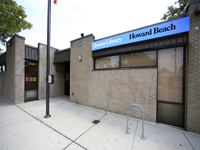Is There an Anticancer Diet?Eating Certain Fruits and Vegetables May Decrease Cancer Risk and Even Stop Its Growth
By Kathleen DohenyWebMD Medical News
Reviewed by Brunilda Nazario, MD
Dec. 6, 2007 -- Certain fruits and vegetables may reduce your risk of cancer and may even help stop cancer in its tracks, according to new research.
While there's not really an "anticancer diet," eating plenty of certain fruits and vegetables can help reduce your risk of getting cancer, researchers reported today at the American Association for Cancer Research's Sixth Annual International Conference on Frontiers in Cancer Prevention Research in Philadelphia.
Their findings confirm and strengthen previous research that have linked a high intake of fruits and vegetables with a reduced cancer risk.
On the most recent "A" list: black raspberries for warding off esophageal cancer and raw cruciferous vegetables like broccoli for preventing bladder cancer .
Despite the new findings, there are no "magic" foods, says Laura Kresty, PhD, assistant professor of nutrition at the Comprehensive Cancer Center at Ohio State University, Columbus, and one of the presenters. "The big take-home message is, eat a variety [of fruits and vegetables]. Eat what is in season. The real goal is to try to increase your overall consumption of fruits and vegetables and the proportion of your diet that is made up of a plant-based diet."
Black Raspberries May Reduce Esophageal Cancer Risk
Eating black raspberries may protect people at high risk of getting cancer of the esophagus, Kresty and her colleagues found. They had previously found that black raspberries in animal experiments inhibit cancers of the oral tract, esophagus, and colon.
The fruit probably does so, she says, by reducing oxidative stress -- the destruction done to cells by free radicals -- and by decreasing DNA damage and the growth rates of cells.
They decided to expand the study to high-risk patients with a precancerous condition in the esophagus called Barrett's esophagus. Those with the condition have a 30 to 40 times higher risk of getting esophageal cancer, Kresty says. The cancer is deadly, with only a 15% five-year survival rate.
In the study, 20 patients ate an ounce or an ounce and a half (more for the men) of freeze-dried black raspberries daily for 26 weeks. "We measured markers for oxidative stress," Kresty says. One of those is a substance called 8-Isoprostane, which is excreted in urine.
"At the end of the study, 58% of the patients had marked declines in the 8-Isoprostane," reflecting less oxidative stress.
The researchers also looked at tissue levels of an enzyme called GSTpi, which helps detoxify carcinogens. They found that 37% of patients had an increase in this protective enzyme.
The fruit "appears protective," Kresty tells WebMD, although the study did not include long-term follow-up to see if fewer people actually got cancer.
Black raspberries, she says, are found in some grocery stores. "More commonly they are the type you pick," she says.
Vegetables for Bladder Cancer Prevention
Raw cruciferous vegetables such as broccoli, broccoli sprouts, cabbage, and cauliflower seem to reduce bladder cancer risk by about 40%, researchers from Roswell Park Cancer Institute in Buffalo, N.Y., reported at the meeting. That's due to compounds they contain called isothiocyanates or ITCs, thought to be protective against bladder cancer."Raw cruciferous vegetables are better than the cooked vegetables because cooking time reduces the amount of isothiocyanates by 60% to 90%," says Li Tang, MD, PhD, a postdoctoral fellow at Roswell Park who led one of the studies.
Her team surveyed the eating habits of 275 people with a diagnosis of bladder cancer and 825 healthy people. They asked them about pre-diagnosis intakes of raw and cooked vegetables, their cigarette smoking habits, and other risk factors.
Nonsmokers who ate at least three servings a month were about 73% less likely to develop bladder cancer than those who smoked and ate less than three servings a month.
Broccoli sprouts may be even better to ward off bladder cancer, says Yuesheng Zhang, MD, PhD, professor of oncology at Roswell Park Cancer Institute, who studied the effect of broccoli sprouts in animals. His team studied four groups of animals. One group drank a solution known to cause bladder cancer and ate freeze-dried extracts of broccoli sprouts; other groups just ate the broccoli extract or just drank the carcinogen. Another group did nothing, serving as the comparison group.
"Of those who took the carcinogen [only], 96% had a tumor" after 10 months, he says. Of those who drank the carcinogen and also ate the broccoli extract, only 37 developed cancer.
Again, it's the ITCs that are thought to be protective. Broccoli sprouts seem to work, he says, by activating two enzymes important in detoxifying carcinogens.
Monday, February 25, 2008
Is There an Anticancer Diet?Eating Certain Fruits and Vegetables May Decrease Cancer Risk
发表者
Sherwood
位置在:
7:18 PM
![]()
Subscribe to:
Post Comments (Atom)





No comments:
Post a Comment